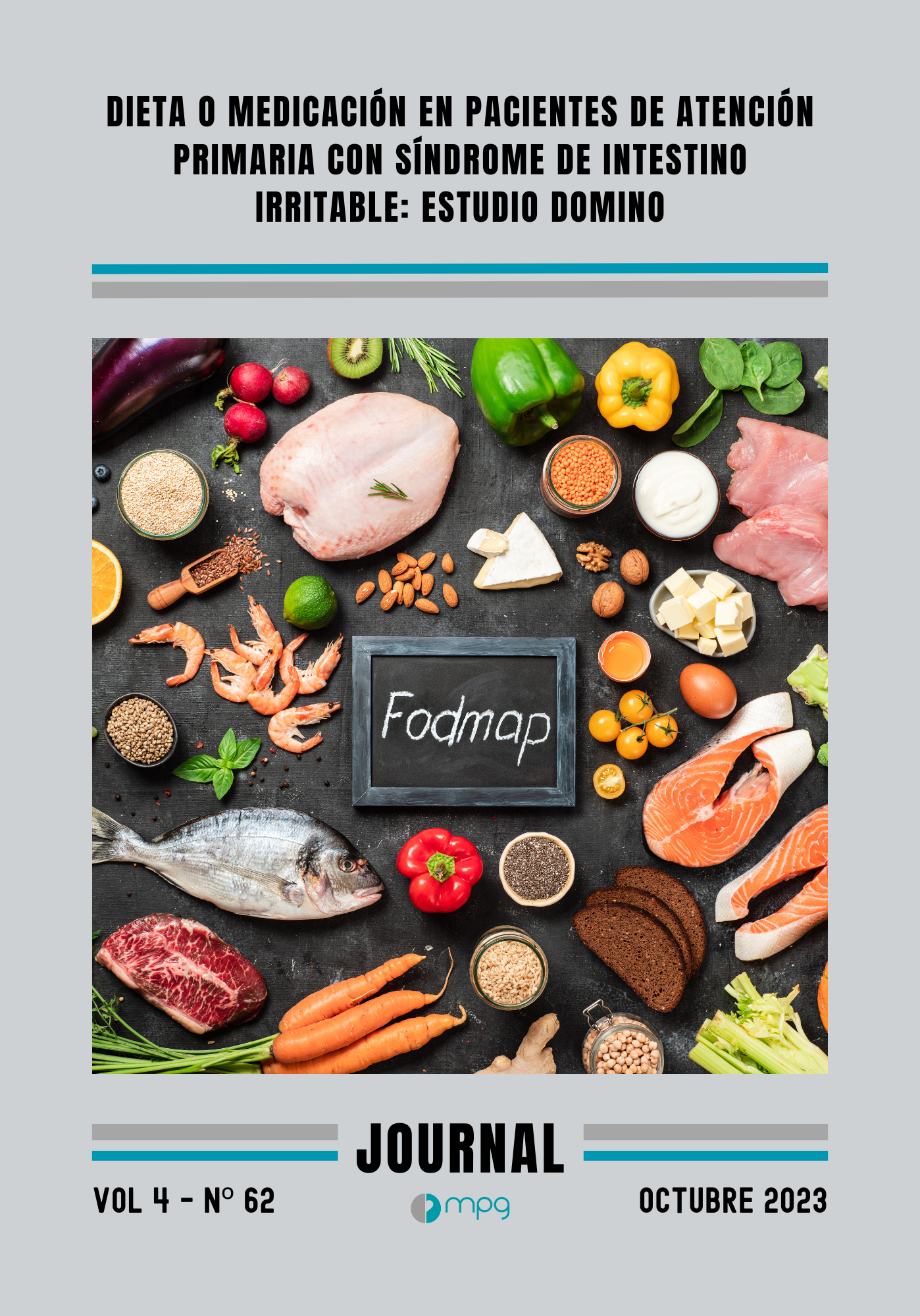4. Dieta o medicación en pacientes de Atención Primaria con síndrome de intestino irritable: estudio DOMINO
Palabras clave:
FODMAP, Síndrome intestino irritable, MicrobiotaResumen
La dieta baja en oligosacáridos, disacáridos, monosacáridos y polioles fermentables (FODMAP), a iniciar desde Atención Primaria, es una de las propuestas terapéuticas en el manejo sintomático del síndrome de intestino irritable (SII). Éste se trata normalmente con espasmolíticos musculotrópicos. En esta cohorte la aplicación de una dieta durante 8 semanas fue superior a la terapia médica estándar.
The diet low in fermentable oligosaccharides, disaccharides, monosaccharides and polyols (FODMAP) to start from Primary Care, is one of the therapeutic proposals in the symptomatic management of irritable bowel syndrome (IBS). This is usually treated with muscle-tropic spasmolytics. In this cohort, the application of a diet for 8 weeks was superior to standard medical therapy.
Referencias
Vol. 12; Nº8; Varjú P, Farkas N, Hegyi P, Garami A, Szabó I, Illés A, Solymár M, Vincze Á, Balaskó M, Pár G, Bajor J, Szűcs Á, Huszár O, Pécsi D, Czimmer J. Low fermentable oligosaccharides, disaccharides, monosaccharides and polyols (FODMAP) diet improves symptoms in adults suffering from irritable bowel syndrome (IBS) compared to standard IBS diet: A meta-analysis of clinical studies. PLoS One. 2017 Aug 14;12(8):e0182942. doi: https//doi.org/10.1371/journal.pone.0182942.
Vol. 55; Nº3; págs: 897-906. Marsh A, Eslick EM, Eslick GD. Does a diet low in FODMAPs reduce symptoms associated with functional gastrointestinal disorders? A comprehensive systematic review and meta-analysis. Eur J Nutr. Doi: https//doi.org/10.1007/s00394-015-0922-1.
Vol. 149; Nº6; págs. 1399-407. 2015. Böhn L, Störsrud S, Liljebo T, et al. Diet low in FODMAPs reduces symptoms of irritable bowel syndrome as well as traditional dietary advice: a randomized controlled trial. Gastroenterology. Doi: https://doi.org/10.1053/j.gastro.2015.07.054.
Vol. 111; Nº 12; págs. 1824-1832. Eswaran SL, Chewy WD, Han-Markey T, Ball S, Jackson K. A Randomized Controlled Trial Comparing the Low FODMAP Diet vs. Modified NICE Guidelines in US Adults with IBS-D. Am J Gastroenterology. Doi: https://doi.org/10.1038/ajg.2016.434.
Vol. 33; Nº6; págs. 1192-1199. 2018. Zahedi MJ, Behrouz V, Azimi M. Low fermentable oligo-di-mono-saccharides and polyols diet versus general dietary advice in patients with diarrhea-predominant irritable bowel syndrome: A randomized controlled trial. J Gastroenterol Hepatol. Doi: https://doi.org/10.1111/JGH.14051.
Vol. 19; Nº3; págs 136-141. 2018. Salem AE, Singh R, Ayoub YK, Khairy AM, Mullin GE. The gut microbiome and irritable bowel syndrome: State of art review. Arab J Gastroenterol. Doi: https://doi.org/ 10.1016/j.ajg.2018.02.008.
Vol. 13; 2022. Chen M, Ruan G, Chen L, Ying S, Li G, Xu F, Xiao Z, Tian Y, Lv L, Ping Y, Cheng Y, Wei Y. Neurotransmitter and Intestinal Interactions: Focus on the Microbiota-Gut-Brain Axis in Irritable Bowel Syndrome. Front Endocrinol (Lausanne). Doi: https://doi.org/10.3389/fendo.2022.817100.
Vol 64; Nº1; págs 93-100. 2015. Halmos EP, Christophersen CT, Bird AR, et al. Diets that differ in their FODMAP content alter the colonic luminal microenvironment. Gut. Doi: https://doi.org/10.1136/ gutjnl-2014-307264.




MPG Journal - Política de privacidad